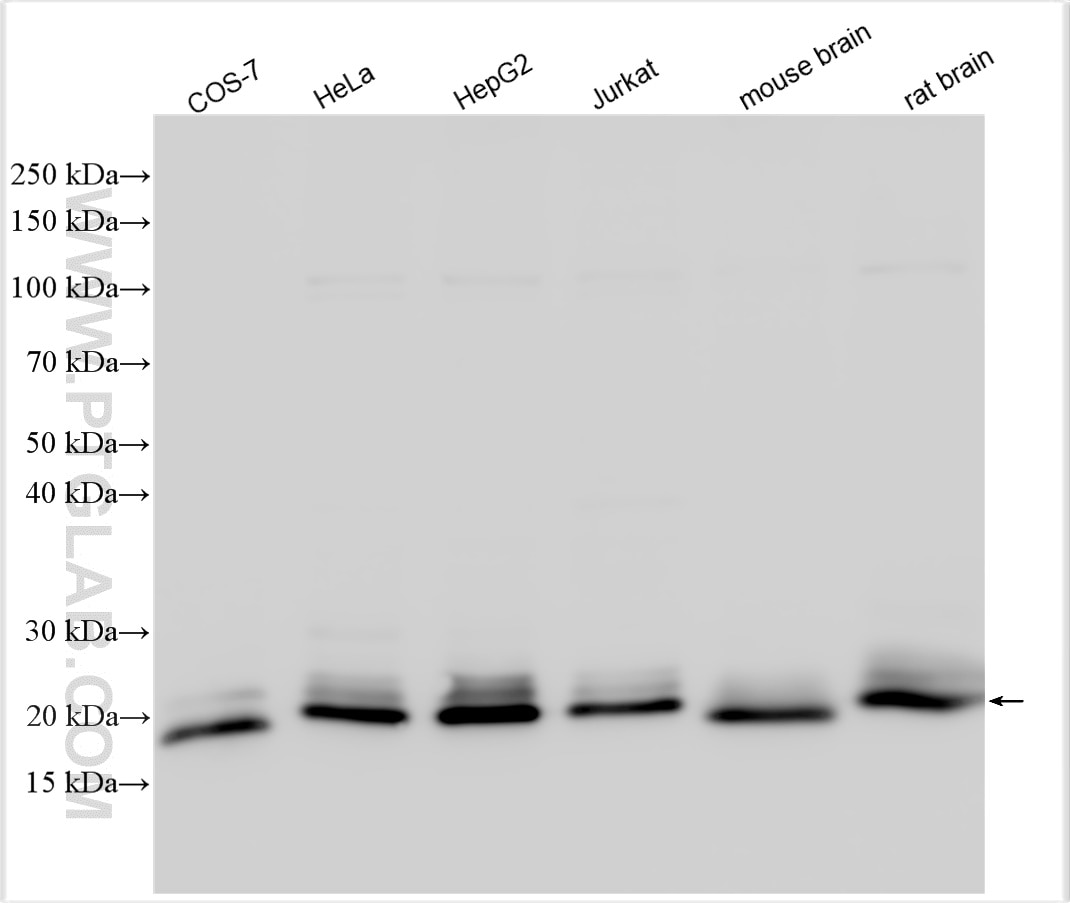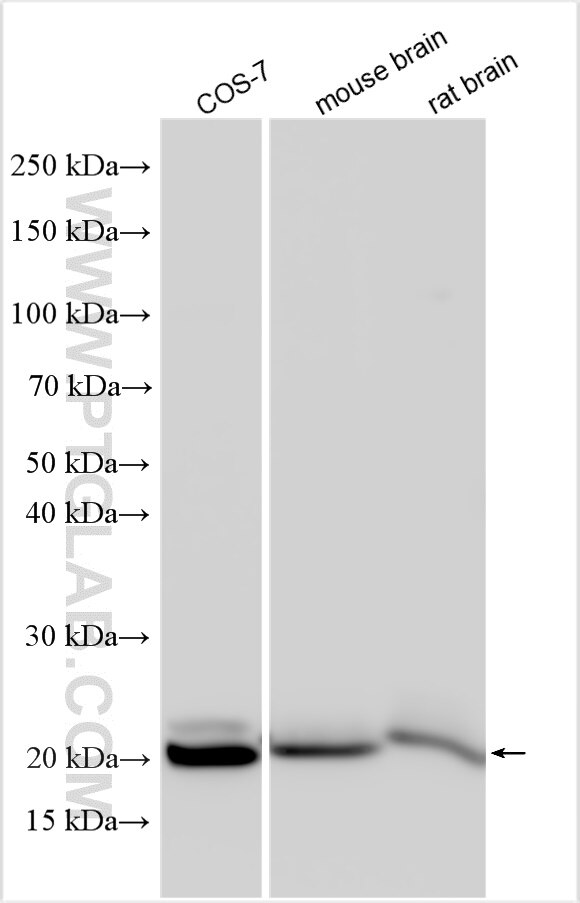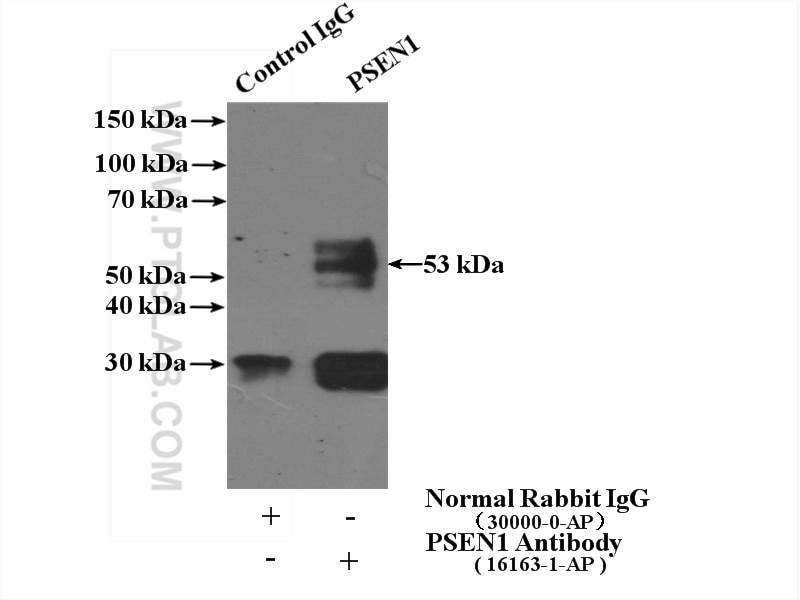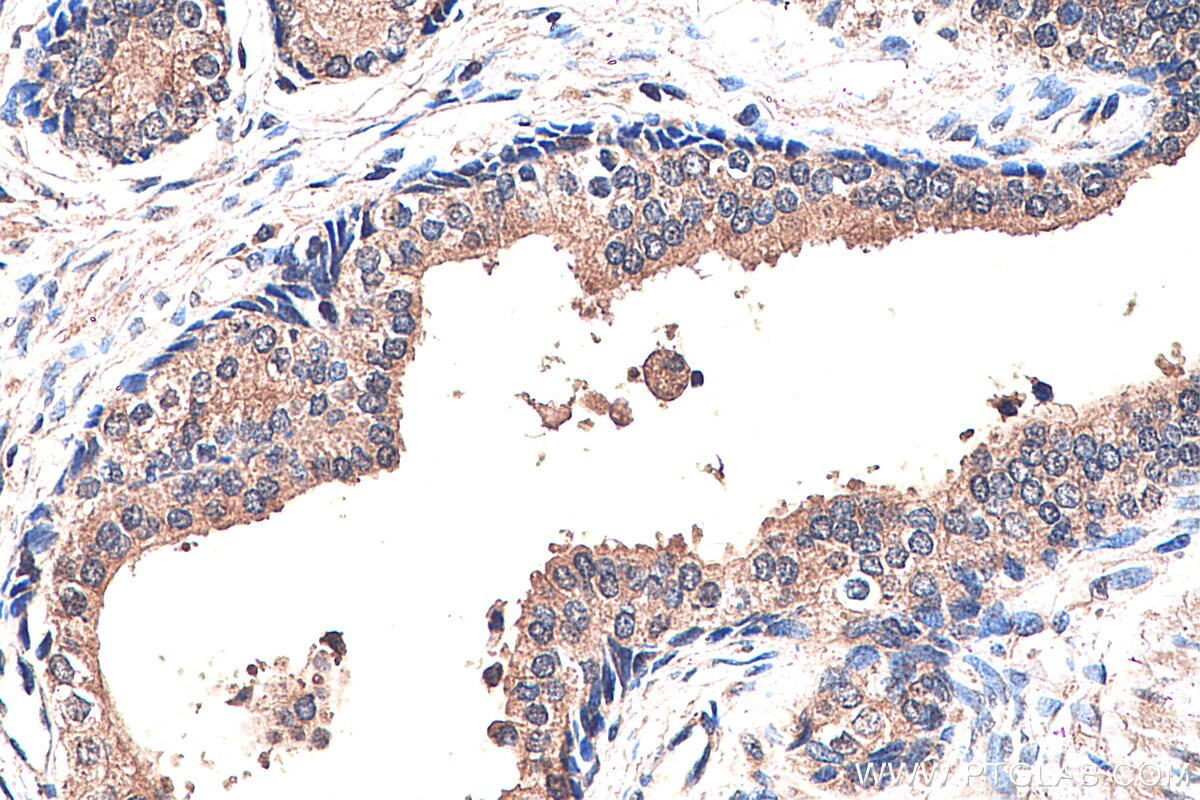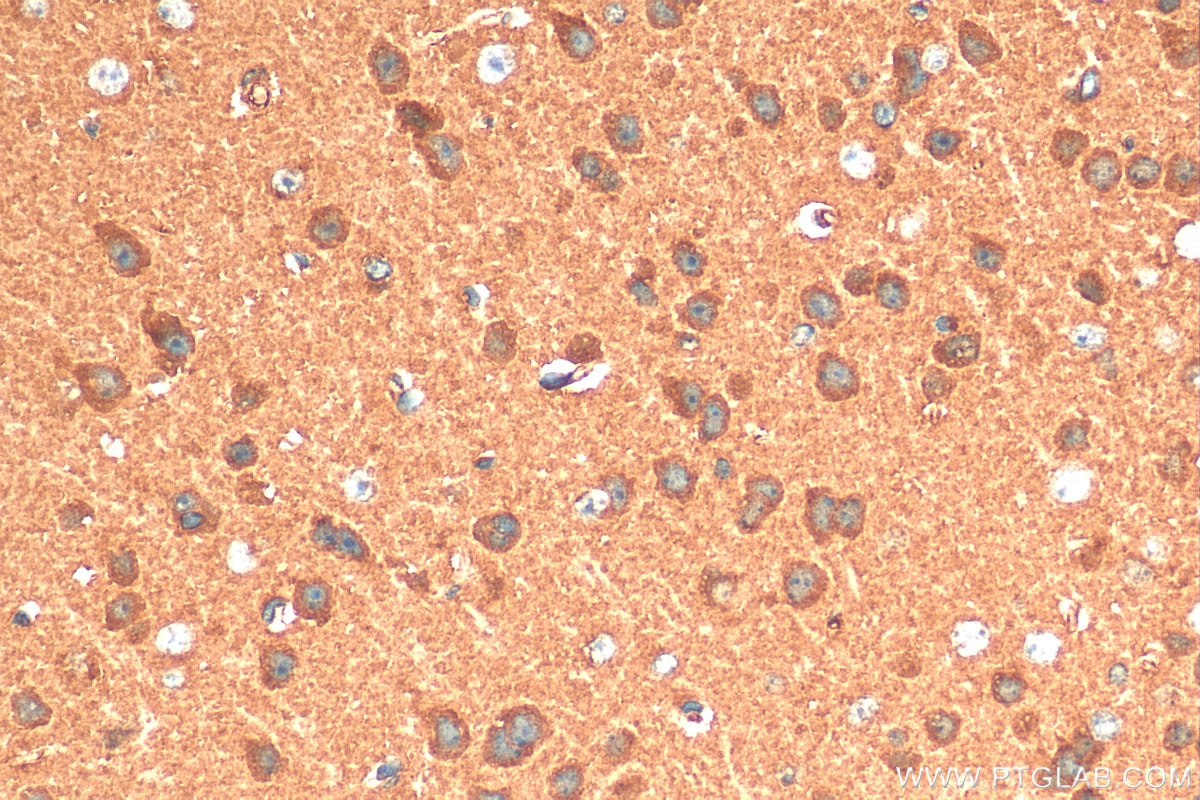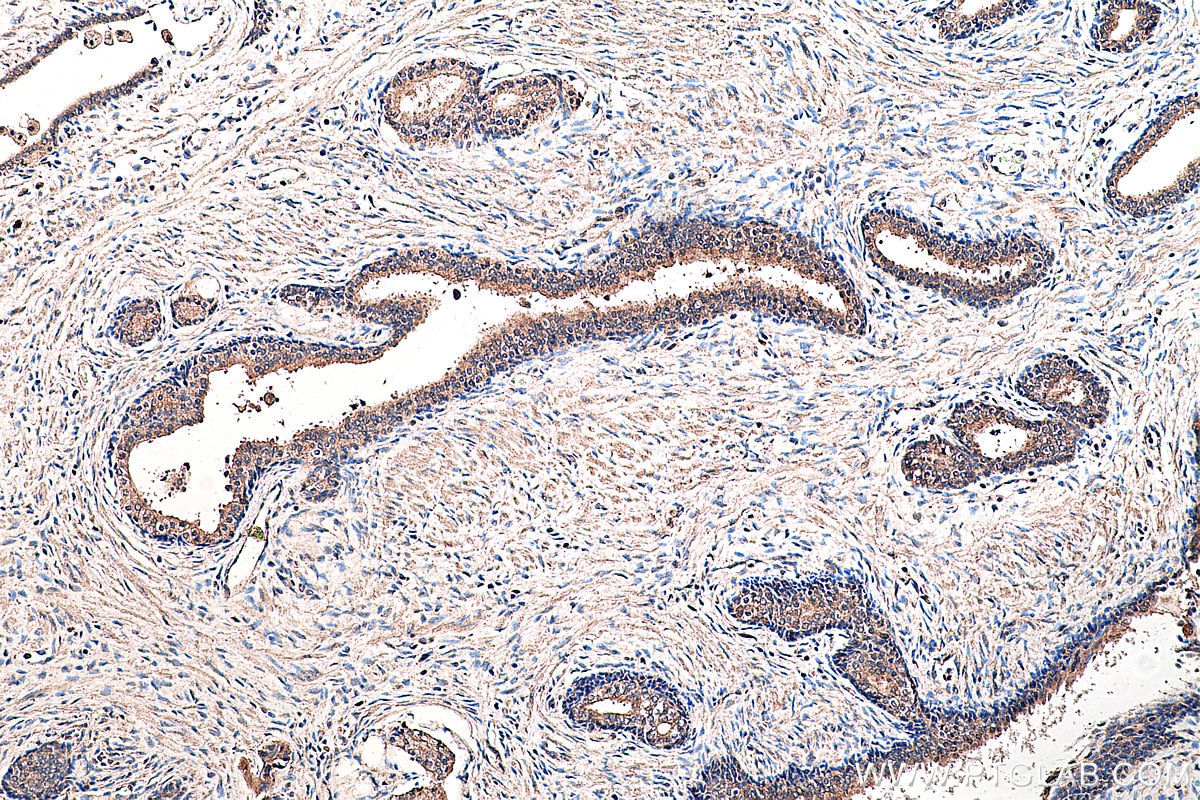- Featured Product
- KD/KO Validated
Presenilin-1-Specific Polyklonaler Antikörper
Presenilin-1-Specific Polyklonal Antikörper für IHC, IP, WB, ELISA
Wirt / Isotyp
Kaninchen / IgG
Getestete Reaktivität
Affe, human, Maus, Ratte und mehr (1)
Anwendung
WB, IP, IHC, ELISA
Konjugation
Unkonjugiert
Kat-Nr. : 16163-1-AP
Synonyme
Galerie der Validierungsdaten
Geprüfte Anwendungen
| Erfolgreiche Detektion in WB | COS-7-Zellen, HeLa-Zellen, HepG2-Zellen, Jurkat-Zellen, Maushirngewebe, Rattenhirngewebe |
| Erfolgreiche IP | Mausnierengewebe |
| Erfolgreiche Detektion in IHC | humanes Prostatakarzinomgewebe, Maushirngewebe Hinweis: Antigendemaskierung mit TE-Puffer pH 9,0 empfohlen. (*) Wahlweise kann die Antigendemaskierung auch mit Citratpuffer pH 6,0 erfolgen. |
Empfohlene Verdünnung
| Anwendung | Verdünnung |
|---|---|
| Western Blot (WB) | WB : 1:1000-1:8000 |
| Immunpräzipitation (IP) | IP : 0.5-4.0 ug for 1.0-3.0 mg of total protein lysate |
| Immunhistochemie (IHC) | IHC : 1:500-1:2000 |
| It is recommended that this reagent should be titrated in each testing system to obtain optimal results. | |
| Sample-dependent, check data in validation data gallery | |
Veröffentlichte Anwendungen
| KD/KO | See 1 publications below |
| WB | See 14 publications below |
| IHC | See 1 publications below |
Produktinformation
16163-1-AP bindet in WB, IP, IHC, ELISA Presenilin-1-Specific und zeigt Reaktivität mit Affe, human, Maus, Ratten
| Getestete Reaktivität | Affe, human, Maus, Ratte |
| In Publikationen genannte Reaktivität | human, Hausschwein, Maus, Ratte |
| Wirt / Isotyp | Kaninchen / IgG |
| Klonalität | Polyklonal |
| Typ | Antikörper |
| Immunogen | Peptid |
| Vollständiger Name | presenilin 1 |
| Berechnetes Molekulargewicht | 53 kDa |
| Beobachtetes Molekulargewicht | 21kDa |
| GenBank-Zugangsnummer | NM_000021 |
| Gene symbol | PSEN1 |
| Gene ID (NCBI) | 5663 |
| Konjugation | Unkonjugiert |
| Form | Liquid |
| Reinigungsmethode | Antigen-Affinitätsreinigung |
| Lagerungspuffer | PBS mit 0.02% Natriumazid und 50% Glycerin pH 7.3. |
| Lagerungsbedingungen | Bei -20°C lagern. Nach dem Versand ein Jahr lang stabil Aliquotieren ist bei -20oC Lagerung nicht notwendig. 20ul Größen enthalten 0,1% BSA. |
Hintergrundinformationen
PSEN1(presenilin-1) is also named as AD3, PS1, PSNL1 and belongs to the peptidase A22A family. It directly influences Netrin/DCC signaling with cell type precision and spatiotemporal specificity, and is a key neural circuit builder that gates the spatiotemporal pattern of guidance signaling, thereby ensuring neural projections occur with high fidelity(PMID:21215373). The 46-kDa PSEN1 holoprotein is cleaved into a D30-kDa N-terminal fragment (NTF) and a D20-kDa C-terminal fragment (CTF) by the 26S proteasome(PMID:10527805). It has 7 isoforms produced by alternative splicing. This antibody is specific to isoform1(53 kDa), isoform2(52 kDa), isoform4(21 kDa), isoform7(49 kDa) of this protein.
Protokolle
| Produktspezifische Protokolle | |
|---|---|
| WB protocol for Presenilin-1-Specific antibody 16163-1-AP | Protokoll herunterladen |
| IHC protocol for Presenilin-1-Specific antibody 16163-1-AP | Protokoll herunterladen |
| IP protocol for Presenilin-1-Specific antibody 16163-1-AP | Protokoll herunterladen |
| Standard-Protokolle | |
|---|---|
| Klicken Sie hier, um unsere Standardprotokolle anzuzeigen |
Publikationen
| Species | Application | Title |
|---|---|---|
Adv Sci (Weinh) Bone Marrow-Derived GCA+ Immune Cells Drive Alzheimer's Disease Progression | ||
Brain MMP13 inhibition rescues cognitive decline in Alzheimer transgenic mice via BACE1 regulation. | ||
Cell Rep CIP2A Causes Tau/APP Phosphorylation, Synaptopathy, and Memory Deficits in Alzheimer's Disease. | ||
J Neuroinflammation Far infrared light irradiation enhances Aβ clearance via increased exocytotic microglial ATP and ameliorates cognitive deficit in Alzheimer's disease-like mice. | ||
Cell Commun Signal Presenilin1 exerts antiproliferative effects by repressing the Wnt/β-catenin pathway in glioblastoma.
| ||
Mol Neurobiol Memantine, a Noncompetitive N-Methyl-D-Aspartate Receptor Antagonist, Attenuates Cerebral Amyloid Angiopathy by Increasing Insulin-Degrading Enzyme Expression. |
Rezensionen
The reviews below have been submitted by verified Proteintech customers who received an incentive forproviding their feedback.
FH Xiaoyu (Verified Customer) (02-07-2024) | Good signal
 |
